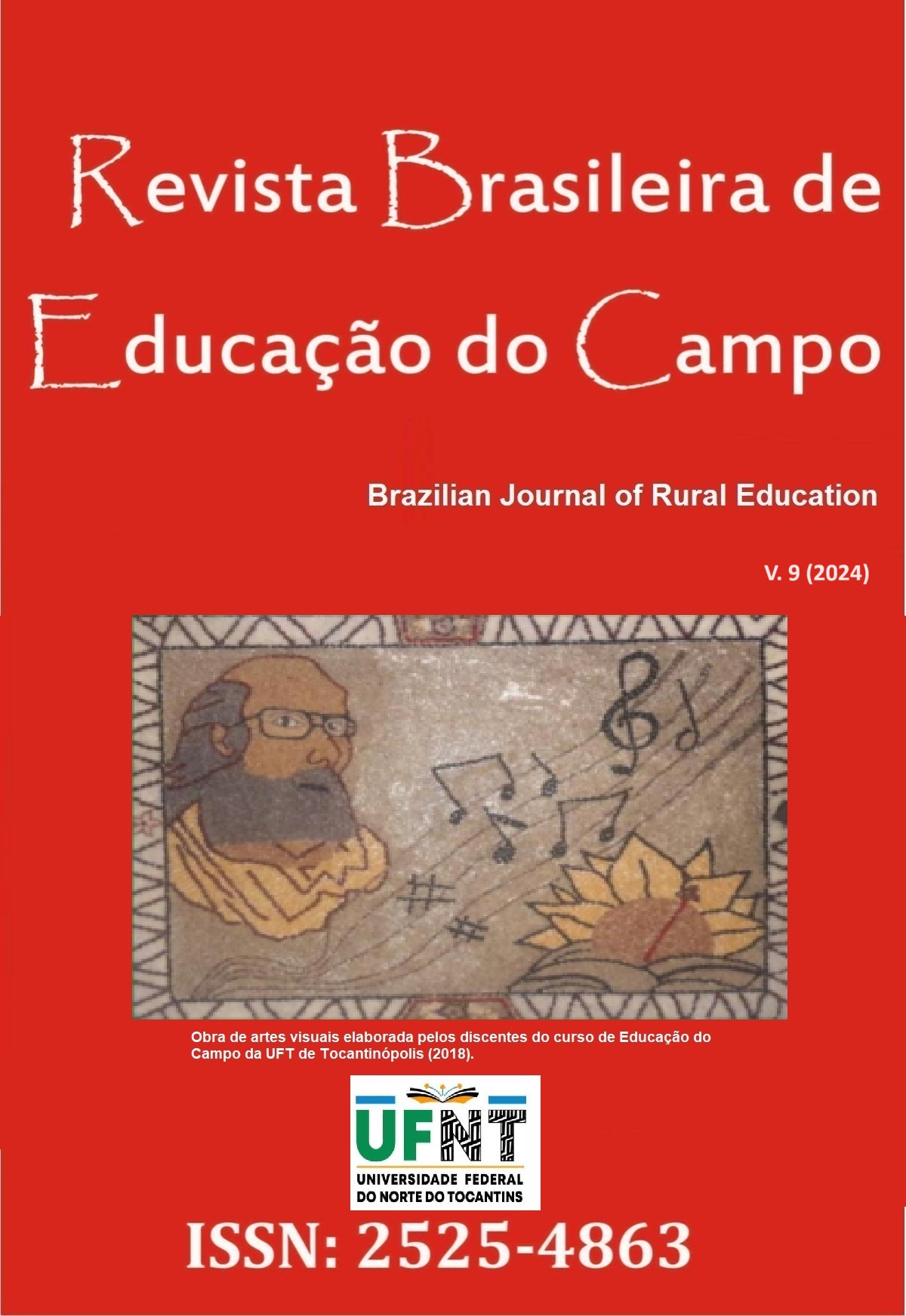The challenges of Rural Education during the pandemic: the case of the Unipampa Rural Education course - Campus Dom Pedrito/RS
DOI:
https://doi.org/10.70860/ufnt.rbec.e16181Abstract
ABSTRACT: This article, in addition to presenting the context in which Unipampa's Countryside Education course has been consolidating itself, aims to address the strategies of the Countryside Education course in confronting the pandemic. To this end, a broad consultation was carried out with students to develop these strategies. A questionnaire was developed using an online form, consisting of multiple choice questions, with socioeconomic and psychosocial dimensions, information about Covid-19 and digital technologies, the impacts of the virus on school and study conditions. The application provided an active search for all students, through social networks, in order to access our entire audience. Based on this understanding, it was possible to identify situations of multiple vulnerabilities prevalent among students on the course and, concomitantly, plan actions capable of enabling the continuity of studies, given the precariousness of education and access conditions for students, under this new pandemic perspective. Although the course's efforts to adapt pedagogical actions have minimized the negative effects of imposing the remote-emergency model, we noted the complexity of implementing the actions developed, at the same time that we were able to maintain resistance articulations of Rural Education and revive hopes.
Downloads
Literaturhinweise
Arroyo, M. G. (2020). Prefácio: Memórias de Educação do Campo, In Santos, C. A. dos, Kolling, E. J., Rocha, E. N., Molina, M. C., & Caldart, R. S. (Orgs.). Dossiê educação do campo. Brasília, DF: Editora Universidade de Brasília. Recuperado de https://fonec.org/wpcontent/uploads/2021/04/Dossie_Educacao_do_Campo_Ebook-1.pdf
Federici, S. (2019). O ponto zero da revolução: trabalho doméstico, reprodução e luta feminista Trans: Coletivo Sycorax. São Paulo: Elefante.
Freitas, L. C. (2020, 08 de março). Lições da privatização na Educação. [Web log post]. Recuperado de https://avaliacaoeducacional.com/2020/10/15/licoes-da-privatizacao-na-educacao/
Gurur, D., & Silva, N.R. (2021). Agroecologia. In Dias, A. P., Stauffer, A. B., Moura, L. H. G., Vargas, M. C. (Orgs.). Dicionário de Agroecologia e Educação (pp. 59-72). Rio de Janeiro, RJ: Escola Politécnica de Saúde Joaquim Venâncio.
Kolling, E. J., Nery, F. S. C., & Molina, M.C. (Orgs.). (1999). Por uma Educação Básica do Campo: memória. Brasília, DF: Editora Universidade de Brasília. (Coleção por uma Educação Básica do Campo, nº1).
Lima, T. (2020). Educação básica e o acesso de transexuais e travestis à educação superior. Revista Do Instituto De Estudos Brasileiros, 1(77), 70–87. https://doi.org/10.11606/issn.2316-901X.v1i77p70-87. DOI: https://doi.org/10.11606/issn.2316-901X.v1i77p70-87
Martins, A. F. G. (2022). A questão agrária no Brasil: da Colônia ao Governo Bolsonaro. São Paulo, SP: Expressão Popular.
Mbembe, A. (2018). Necropolítica: Biopoder, soberania, estado de exceção, política de morte. Trans: Renata Santini. São Paulo, SP: n-1 edições.
Rocha, J. C. C. (2021). Guerra Cultural e Retórica do Ódio (Crônicas de um Brasil Pós-Político). Goiânia, GO: Editora Caminhos.
Santos, C. A. (2018). O golpe e a cassação do direito fundamental dos camponeses à Educação do Campo. Revista Okara: Geografia em Debate, 12(2), 422-433. DOI: https://doi.org/10.22478/ufpb.1982-3878.2018v12n2.41323
Segundo IBGE, 4,3 milhões de estudantes brasileiros entraram na pandemia sem acesso à internet. (2021, 14 de abril). [Web log post]. Recuperado de https://undime.org.br/noticia/14-04-2021-13-19-segundo-ibge-43-milhoes-de-estudantes-brasileiros-entraram-na-pandemia-sem-acesso-a-internet
Universidade Federal do Pampa (Unipampa). (2023). Projeto Pedagógico do Curso de Educação do Campo. Universidade Federal do Pampa, Bagé, RS.
Downloads
Veröffentlicht
Zitationsvorschlag
Ausgabe
Rubrik
Lizenz
Copyright (c) 2024 Jonas Anderson Simões das Neves, Annie Mehes Maldonado Brito, Carla Valeria Leonini Crivellaro, José Guilherme Franco Gonzaga

Dieses Werk steht unter der Lizenz Creative Commons Namensnennung 4.0 International.
Creative Commons Attribution License
Creative Commons Attribution License
Proposal for Copyright Notice Creative Commons
1. Policy Proposal to Open Access Journals
Authors who publish with this journal agree to the following terms:
A. Authors retain copyright and grant the journal right of first publication with the work simultaneously licensed under the Creative Commons Attribution License that allows sharing the work with recognition of its initial publication in this journal.
B. Authors are able to take on additional contracts separately, non-exclusive distribution of the version of the paper published in this journal (ex .: publish in institutional repository or as a book), with an acknowledgment of its initial publication in this journal.
C. Authors are permitted and encouraged to post their work online (eg .: in institutional repositories or on their website) at any point before or during the editorial process, as it can lead to productive exchanges, as well as increase the impact and the citation of published work (See the Effect of Open Access).














